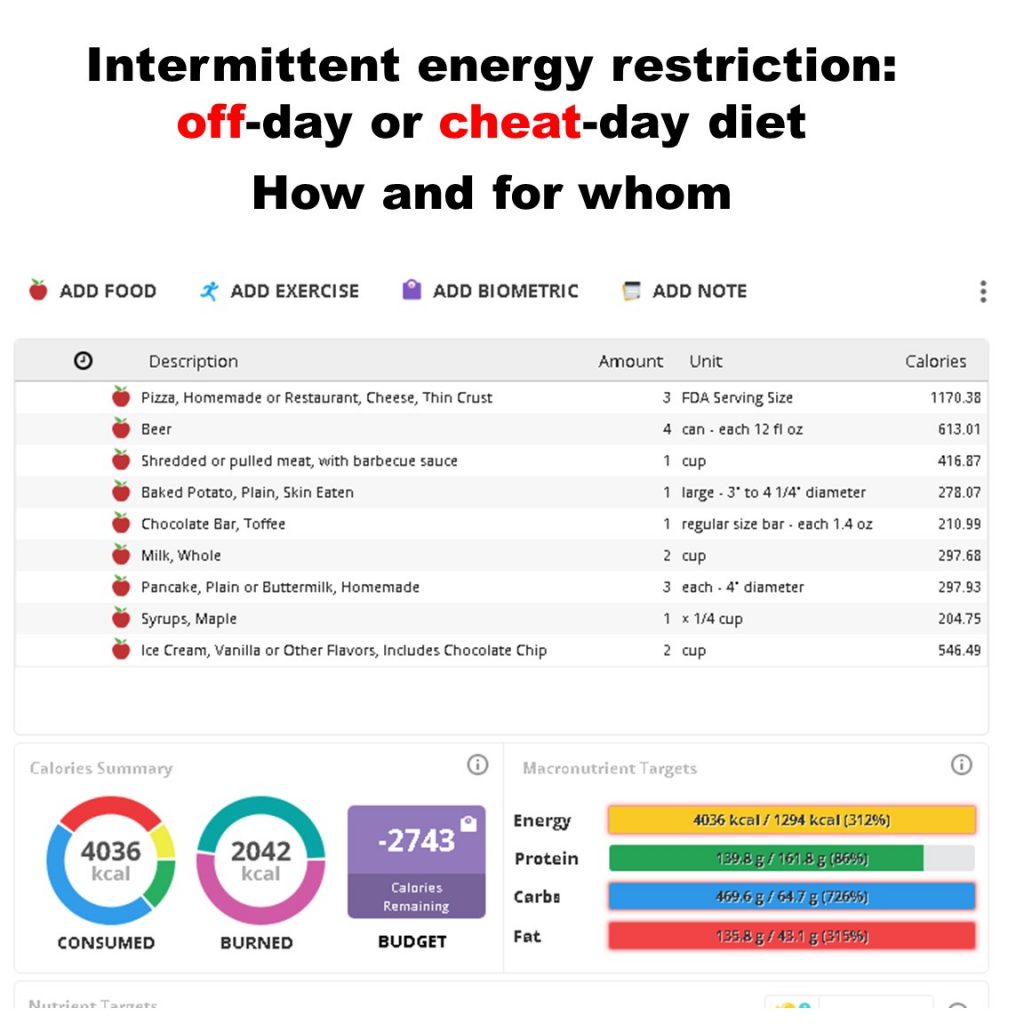Everyone who has ever considered a weight control or weight loss program heard about “cheat days” and “off days”. The technical term for this is “intermittent energy restriction” (IER). Like “intermittent fasting”, it is a diet regimen in which longer periods with a constant energy consumption level are interspersed with an unrestricted period or a fasting period.
Usually, these “intermittent” diets are organized on a 7 day period for convenience. They are usually referred to as 5:2, 6:1, meaning 5 days on constant energy consumption and 2 days with altered energy consumption.
“Off-days” or “cheating days” were always very popular: once a week, the dieting person ate (and drank) whatever they wanted. At first, there was no rationale behind it. It was just thought to be mentally good as opposed to the mentally stressful calorie restriction. A few decades ago, as endocrine responses to calorie restriction were identified, the idea was to “wake up” leptin and thyroid response, both inhibited during calorie restriction.
The increased thermogenesis caused by the reversed hormonal response may not last long enough to consume the excess in the energy of the off-day. This is when it started being questioned.
The figure above is a simulated unrestricted diet for me. It is 200% of my calorie demand and about 350% of my regular calorie consumption. My average calorie consumption now is at about 1350 calories. I have one higher carbohydrate day each week where higher is not above 100g and the highest calorie consumption in the past months was 2500.
Simulated weekly calorie consumption with constant calorie restriction: 9450 (monthly 37800).
Simulated weekly calorie consumption with one “almost fasting” day (300 calories): 8400 (monthly 33600).
Simulated weekly calorie consumption with a 2200 calorie “almost unrestricted” day: 10300 (monthly 41200)
Simulated weekly calorie consumption with an unrestricted (4000 calories) day: 12100 (monthly 48400).
The literature that suggests any positive effect for IER is mostly about obese patients (diabetic or cancer patients as well). Even then, meta-analyses show no difference in weight loss between IER and constant calorie restriction, at best. As for athletes, results are inconclusive.
With the simulations I did, considering that I am slowly crawling my way back into a 54.5kg-55.5kg (120lbs-122lbs) or less and therefore adopting a calorie-restrictive diet, I see no way IER could work. Of course, that depends on what “unrestricted” means to the individual, which certainly is correlated with emotional traits. I am a pretty damaged person who craves anything that will reduce that background pain and darkness inside, now unfortunately matched with chronic joint pain. If I suspend all restriction, I’m going for alcohol, pizza, and chocolate. The simulation in the picture is conservative: on a “good” day, I can drink at least 4 times this amount and I have done this a lot. I’ve never been an addict but I have been reckless and completely unrestrained. It didn’t affect my weight that much (or nothing). It affected my life a lot.
So maybe not such a great idea. I stand with my position concerning self-regulatory behavior: ego depletion or not, there are certain aspects of a person’s behavior that can’t go under-monitored or unmonitored.
It’s not a great idea for those who need to manage or reduce weight, not such a great idea for people in mental suffering (depression or trauma-related conditions) compensated with drugs and alcohol and not such a great idea for those undergoing extreme stress.
So… everybody? Or most people? I think so.
Some readings
Intermittent Dieting: Theoretical Considerations for the Athlete.
Intermittent energy restriction improves weight loss efficiency in obese men: the MATADOR study.
Weight loss increases circulating levels of ghrelin in human obesity
Caloric restriction induces energy-sparing alterations in skeletal muscle contraction, fiber composition and local thyroid hormone metabolism that persist during catch-up fat upon refeeding

